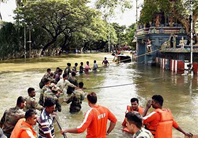CERTIFICATE COURSE IN DISASTER RISK REDUCTION IN EMERGENCIES

Changes in demographics, patterns in human settlement, decisions in land use and political and social policy dynamics have augmented vulnerability to natural as well as man-made disasters and emergencies. Planning and policy processes and interventions can help mitigate on disaster vulnerabilities and increase resilience at every stage on the disaster management cycle, that is, disaster mitigation, preparation, response and recovery. ‘Prevention is better than cure’ is the motto in disaster mitigation.
At the end of the course, learners are expected to have grasped concepts on the roles of the various phases of disaster prevention and management and issues concerning planning and policies in those phases; have an understanding on the comprehensive emergency management from planning and policy perspective as well as the role of governments in disaster planning and policies, indulge in mitigation planning and policy strategies; acquaint self with the factors that give rise to disaster vulnerabilities for example natural, physical, social, economic, policies and governance and have skills on how to assess and manage these vulnerabilities through disaster planning and policy-making. It is also important that learners gain skills and knowledge on data collection and data analysis, methods, tools and in techniques that enhance vulnerability assessments and knowledge building among others.
Topics to be covered in this course include:
- Dimensions of disaster; defining disaster, measurement of disaster, explaining disaster, and managing disaster.
- Framing disaster theories and stories seeking to understand hazards, vulnerability and risk.
- Human rights and disasters
- Vulnerabilities and capacities; disability and disaster; gender sexuality and disaster; children youth and disaster; elderly people and disaster
- Preparedness and response
- Reducing the impacts of disaster; protection through resistance, mitigation through disaster aid and insurance, preparedness, predictions, forecasts and planning
- Historical concepts of disasters and risk
- Politics power and disasters
- Complexity, sustainability and vulnerability; vulnerability and resilience, drivers of vulnerability and disaster.
- Risk assessment and management; the nature of risk, risk assessment, risk perception and communication, risk management and the role of information technology in risk assessment and management.
This three month course is offered through distance learning approach.
Course Begins on 1st of every month for three months.
Course Level: Certificate Course
Cost: Amount USD 400
To register for this course, kindly contact
Capacity Africa
Email:info@capacityafrica.com
Website:https://Capacity Africa
